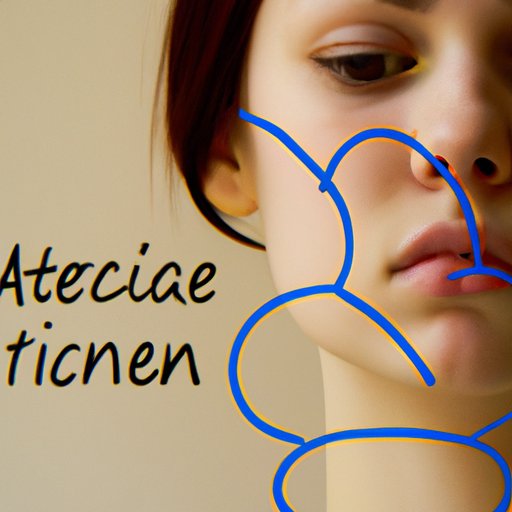Introduction
Acne is a common skin condition that affects many people, particularly during adolescence. It occurs when the pores in the skin become clogged with oil, dead skin cells, or bacteria, resulting in an eruption of pimples, blackheads, whiteheads, and other blemishes on the face, chest, back, and shoulders. While it is often associated with teenagers, adults can also suffer from acne. The question of when acne will go away is one that many people have, and understanding the causes and treatments of acne can help answer this question.

Examining Causes and Treatments of Acne
To better understand what age acne goes away, it is important to look at the causes of acne and the various treatments available. One way to do this is by interviewing dermatologists. Dermatologists are experts in skin health and can provide valuable insight into the causes and treatments of acne. They can recommend different medications or topical treatments to address the underlying causes of acne, as well as suggest lifestyle changes, such as avoiding certain foods or increasing physical activity, that may help reduce the severity of acne.
In addition to consulting a dermatologist, it is important to examine studies of skin changes during adolescence. During puberty, hormone levels fluctuate, which can cause an increase in oil production in the skin. This can lead to clogged pores and an outbreak of acne. Studies have also shown that genetics play a role in the development of acne. If one or both parents had acne, there is a greater likelihood that their child will also develop acne.

Investigating Diet and Lifestyle Habits
Diet and lifestyle habits can also have an effect on the development and severity of acne. Foods high in sugar, dairy, and processed carbohydrates can all trigger an increase in oil production, leading to an outbreak of acne. On the other hand, some foods, such as leafy green vegetables, nuts and seeds, and fish, are thought to be beneficial for skin health and may help reduce the severity of acne.
In addition to diet, lifestyle habits can also influence the development of acne. Stress has been linked to an increase in oil production, which can lead to an outbreak of acne. Additionally, not getting enough sleep can also have an impact on skin health, so it is important to get enough rest each night. Finally, smoking has been linked to an increase in acne, so quitting smoking can help reduce the severity of acne.
Comparing Natural Remedies to Conventional Medical Treatments
There are a number of natural remedies that may help reduce the severity of acne. For example, using tea tree oil, aloe vera, honey, or apple cider vinegar as a topical treatment can help reduce inflammation and kill bacteria. Additionally, taking probiotics and eating foods rich in omega-3 fatty acids may help reduce the severity of acne. It is important to note, however, that these natural remedies are no substitute for proper medical care and should only be used in conjunction with conventional medical treatments.
Conventional medical treatments for acne include topical medications, such as benzoyl peroxide and salicylic acid, as well as oral medications, such as antibiotics and hormonal treatments. These medications can be effective in reducing the severity of acne, but they can also have side effects, so it is important to consult with a dermatologist before starting any new medication.

Examining Social and Emotional Effects of Acne
In addition to the physical effects of acne, there can also be social and emotional effects. People with acne may feel embarrassed or ashamed of their appearance, which can lead to low self-esteem. To cope with these feelings, it is important to practice self-care and to surround yourself with supportive friends and family. Additionally, seeking professional counseling can be beneficial in managing the emotional effects of acne.
Conclusion
In conclusion, acne is a common skin condition that can affect people of all ages. Understanding the causes and treatments of acne is key to knowing when acne will go away. Looking at diet and lifestyle habits, as well as comparing natural remedies to conventional medical treatments, can help reduce the severity of acne. Finally, it is important to recognize the social and emotional effects of acne and seek support to manage these feelings.


